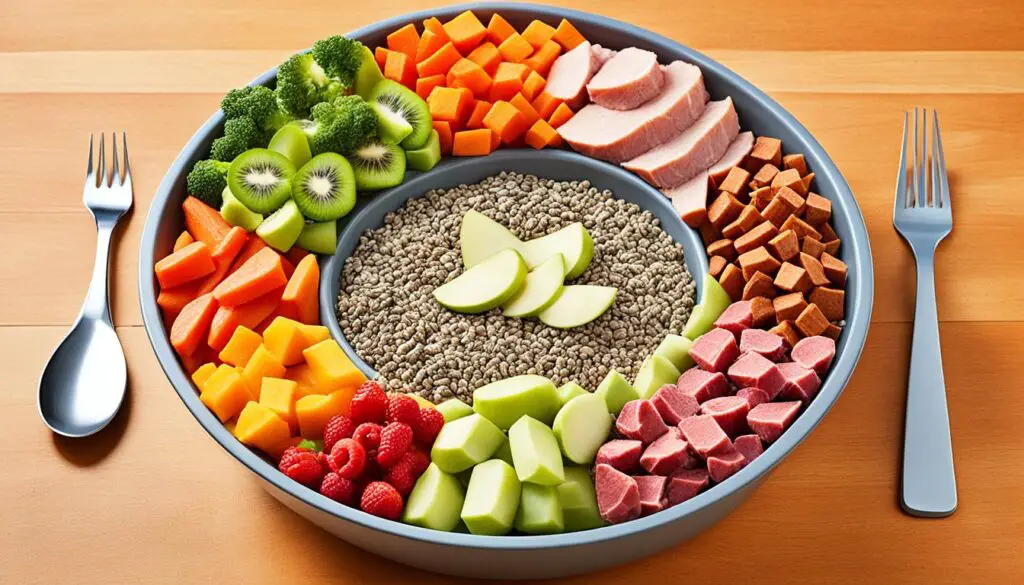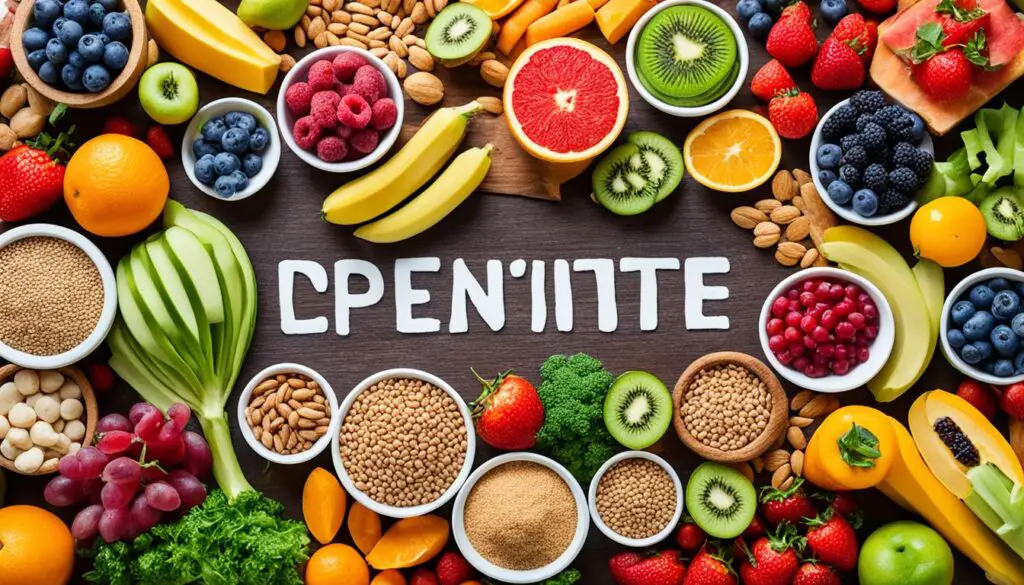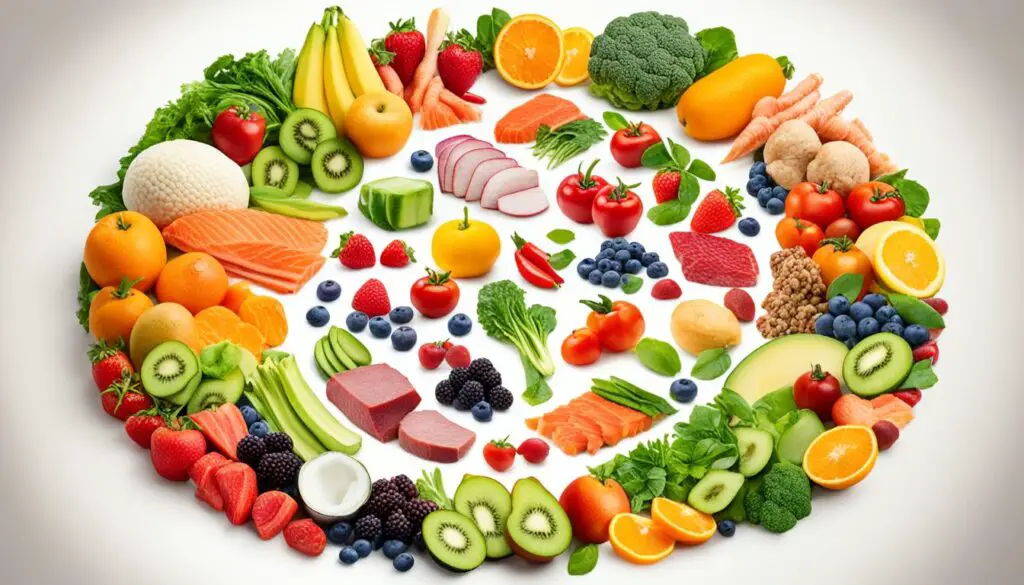A balanced diet is key to your pet’s health and well-being, not very different from us. Pets need the right mix of nutrients for a long and happy life. The food they eat determines how healthy they’ll be.
For pets to eat well, we must think about proteins, fats, carbs, minerals, vitamins, and water. These are all essential for good health. They help with muscle growth, brain function, and keeping the body strong.
Proteins help build and repair muscles, fats give energy and help the brain, and carbs provide quick energy. Minerals and vitamins keep the body running smoothly and the immune system strong. And of course, water is a must for life.
Pets’ dietary needs depend on their age, size, how active they are, and if they have any health issues. We must feed them right according to these aspects. This ensures they get what is best for their health.
Key Takeaways:
- A balanced diet is vital for the overall health and well-being of pets.
- Key components of a balanced diet include proteins, fats, carbohydrates, minerals, vitamins, and water.
- Proteins support muscle development and repair, while fats provide energy and aid brain function.
- Carbohydrates offer quick energy for daily activities.
- Tailor your pet’s diet to their individual needs based on factors like age, size, activity level, and health conditions.
Key Components of a Balanced Diet
A pet’s balanced diet has important parts. Proteins help muscles grow and fix themselves. Fats give energy and are good for the brain. Carbohydrates are for quick daily energy. Fresh fruits and vegetables provide key vitamins and minerals for health. For instance, carrots and peas add fiber and antioxidants. This helps the stomach and makes the immune system stronger. Feeding these elements ensures pets get all the nutrients they need.
“A balanced diet includes proteins, fats, carbohydrates, and fresh fruits and vegetables to provide essential nutrients for your pet’s overall health and well-being.”
Benefits of Key Components in a Pet’s Diet
1. Proteins: They are key for muscle health and repair. They are the foundation of strong tissues. This supports body growth and health.
2. Fats: Fats are a power-packed energy source. They help the brain work well in pets. Fats also help the body absorb nutrients and protect organs.
3. Carbohydrates: Carbs give pets the energy they need every day. They are important for keeping energy levels up in animals.
4. Fruits and Vegetables: Fresh fruits and veggies are full of important vitamins and minerals. They have antioxidants that boost the immune system and keep digestion healthy.
Using these elements in your pet’s meals makes sure they get all they require. It supports their health and keeps them strong.
| Key Components | Role |
|---|---|
| Proteins | Muscle development and repair |
| Fats | Energy source and brain function support |
| Carbohydrates | Quick energy for daily activities |
| Fruits and Vegetables | Vitamins, minerals, antioxidants |
Tailoring Diet to Individual Needs
It’s very important to feed your pet the right food. Every pet is different and needs special care. Your pet’s age, size, how much they move, and their health play a big part in what they should eat.
Tailoring their diet ensures they get the nutrients they need. For example, older dogs may need less food with nutrients that support their joints. But a young and active dog might need extra protein and fat.
When and how much you feed your pet is key too. Young pets need more meals since they’re growing fast. This helps them stay healthy and strong.
Always talk to your vet about your pet’s diet. Vets offer great advice to make a diet plan that fits your pet’s needs.
Think about your pet’s breed, too. Some breeds are more likely to have certain health issues. Their diet can be tweaked to avoid these problems and keep them happy.
The Benefits of a Personalized Diet
A custom diet has a lot of advantages for your fluffy friend. They get the exact nutrients they need. This means they’ll have more energy, manage their weight well, and fight off sickness.
It also considers any food allergies your pet might have. This keeps their stomach happy. A diet made just for them will keep them healthy and smiling for a long time.
Conclusion
Giving our pets a balanced diet is key for their good health. It includes proteins, fats, carbs, minerals, vitamins, and water.
These things are crucial for the health of our pets. They keep them healthy by providing what they need.
It’s important to talk to a vet for a diet that’s right for our pet. Vets can help us make a plan to feed our pet well.
Keeping our pets on a balanced diet is vital. It ensures they stay healthy and live a good life.
FAQ
What is a balanced diet for pets?
A balanced pet diet includes proteins, fats, and carbs. It also has minerals, vitamins, and water. These are crucial for good health and meeting pets’ nutritional needs.
Why is a balanced diet important for pets?
A good diet is vital for pets’ health and well-being. It gives them the nutrients they need for growth and maintenance. A balanced diet helps pets live longer and stay vibrant.
How can I tailor my pet’s diet to their individual needs?
Customize your pet’s diet based on their age, size, and how active they are. Also think about any health issues they have. Choose the right nutrients and feeding time. Your vet can help you make a diet that’s just for your pet.
What role does water play in a pet’s diet?
Water is vital for pets’ health. It helps with digestion and keeping the body cool. Make sure your pet always has clean water to drink.
What are the key components of a balanced diet for pets?
A good pet diet has proteins for muscles, fats for energy, and carbs for quick energy. It also includes fresh fruits and veggies. These give pets the vitamins and minerals they need for good health.



